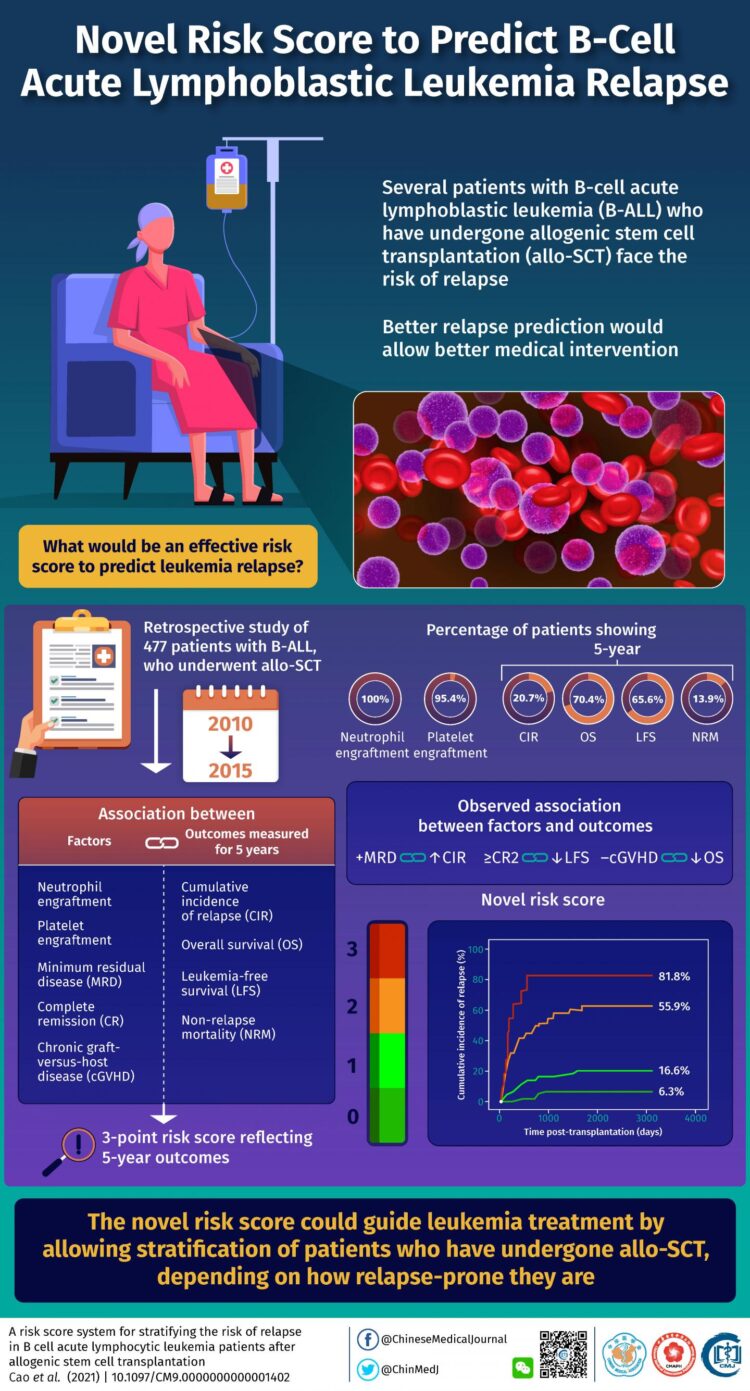Medical researchers in China develop a new risk score to predict relapse of leukemia
Leukemia is a group of blood cancers that affects thousands of people worldwide. However, with advances in medicine, several different types of leukemia can be effectively treated with donor stem cells through allogenic stem cell transplantation (allo-SCT). One such type of leukemia is B-cell acute lymphoblastic leukemia (B-ALL), which is caused by uncontrolled proliferation and prolonged existence of cancerous B-cells. While allo-SCT can ‘cure’ B-ALL in several cases, there are also cases of failure, characterized by deterioration in health after a period of recovery–a phase medically known as relapse. Early prediction of this unfavorable outcome can have several medical advantages for the corresponding patients and the healthcare system.
To address this challenge, a group of medical researchers from Beijing Key Laboratory of Hematopoietic Stem Cell Transplantation, Peking University, and Chinese Academy of Medical Sciences successfully developed an effective risk score that can accurately predict leukemia relapse, after allo-SCT. Their findings have been published as a research article in Chinese Medical Journal.
Detailing the comprehensive methodology used in the study, Dr. Xiao-Jun Huang from Peking University Institute of Hematology, Peking University People’s Hospital, who led the study, explains, “We enrolled 477 patients with B-ALL who underwent allo-SCT at Peking University People’s Hospital from December 2010 to December 2015 in this retrospective study. We aimed to evaluate the factors associated with transplant outcomes after allo-SCT and establish a risk score to identify patients with different probabilities of relapse. We performed univariate and multivariate analyses with the Cox proportional hazards model using time-dependent variables to analyze our data.”
As mentioned by Dr. Huang, some of the analyzed factors associated with allo-SCT transplant outcomes included engraftment of white blood cell like neutrophils, and platelets, in the patients; presence of residual cancer cells, measured as minimal residual disease (MRD); occurrence of chronic graft-versus-host disease (cGVHD); and decrease in leukemia symptoms, medically known as remission, after the procedure. Then, the researchers went on to identify if these factors could be used to determine outcomes like 5-year cumulative incidence of relapse (CIR), overall survival (OS), leukemia-free survival (LFS), and non-relapse mortality, in the patients. Finally, these results were used to formulate the risk score.
In the patients assessed for the different factors previously described, the researchers notably observed that all of them achieved neutrophil engraftment, and 95.4% of them achieved platelet engraftment. Also, they observed that 20.7% of the patients showed CIR, 70.4% of them survived overall, 65.6% endured LFS, and 13.9% succumbed to non-relapse mortality.
Further statistical analysis allowed the researchers to observe distinct associations between the analyzed factors and evaluated outcomes. In this regard, Dr. Huang, excitedly explains, “Our analysis showed that patients with positive post-transplantation MRD, transplanted beyond the first complete remission (?CR2), and without cGVHD, had higher CIR and worse LFS, and OS , than did patients without MRD after transplantation, transplanted in CR1, and with cGVHD.” With such apparent observations, as explained by Dr. Huang, the researchers immediately went on to devising their risk score.
The novel risk score pinned 5-year relapse rates of 6.3%, 16.6%, 55.9%, and 81.8%, as 0, 1, 2, and 3, respectively. The researchers also added that, with increasing risk score, the 5-year LFS and OS values correspondingly decreased.
Overall, the researchers hope that the risk score that they have devised will serve as a guide for leukemia treatment, by allowing stratification of patients with different risks of relapse. They also hope that this will allow for better medical intervention. Indeed, the world can hope that this risk score serves a milestone in leukemia relapse prediction.
###
Reference
Title of original paper: A risk score system for stratifying the risk of relapse in B cell acute lymphocytic leukemia patients after allogenic stem cell transplantation
Journal: Chinese Medical Journal
DOI: https:/
Media Contact
Peifang Wei
[email protected]
Related Journal Article
http://dx.





